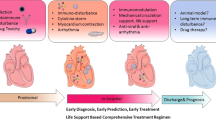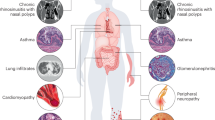Key Points
-
Recurrent pericarditis is the most troublesome complication after an episode of acute pericarditis, and occurs in 20–50% of patients with pericarditis
-
Most cases of recurrent pericarditis are idiopathic, and the pathogenesis is presumed to be immune-mediated or autoinflammatory
-
The mainstay of treatment for recurrent pericarditis is high doses of anti-inflammatory therapy—usually aspirin or an NSAID (generally ibuprofen or indomethacin) plus colchicine
-
Second-line drugs are corticosteroids, to be used at low-to-moderate doses (such as prednisone 0.2–0.5 mg/kg per day or equivalent), plus colchicine
-
Triple combination therapy (aspirin or NSAID plus colchicine and corticosteroid) should be considered for patients with multiple recurrences
-
Additional options for patients with multiple (three or more) failures of conventional anti-inflammatory therapies include azathioprine, intravenous immunoglobulins, and anakinra, with pericardiectomy being a last resort
Abstract
Recurrent pericarditis is one of the most common and troublesome complications after an episode of pericarditis, and affects 20–50% of patients treated for pericarditis. In most of these patients, the pericarditis remains idiopathic, although an immune-mediated (either autoimmune or autoinflammatory) pathogenesis is often presumed. The mainstay of therapy for recurrences is aspirin or NSAIDs, with the adjunct of colchicine. Corticosteroids are a second-line option to be considered for specific indications, such as connective tissue disease or pregnancy; contraindications or intolerance to aspirin, NSAIDs, and/or colchicine; or insufficient response to these medications. Furthermore, corticosteroids can be added to NSAIDs and colchicine in patients with persistent symptoms. In patients who do not respond adequately to any of these conventional therapies, alternative treatment options include azathioprine, intravenous human immunoglobulins, and anakinra. An improved understanding of how recurrent pericarditis develops after an initiating event is critical to prevent this complication, and further research is needed into the pathogenesis of recurrences. We discuss the aetiology and diagnosis of recurrent pericarditis, and extensively review the treatment options for this condition.
This is a preview of subscription content, access via your institution
Access options
Subscribe to this journal
Receive 12 print issues and online access
$209.00 per year
only $17.42 per issue
Buy this article
- Purchase on Springer Link
- Instant access to full article PDF
Prices may be subject to local taxes which are calculated during checkout



Similar content being viewed by others
References
Imazio, M. et al. Colchicine in addition to conventional therapy for acute pericarditis: results of the COlchicine for acute PEricarditis (COPE) trial. Circulation 112, 2012–2016 (2005).
Imazio, M. et al. Colchicine as first-choice therapy for recurrent pericarditis: results of the CORE (COlchicine for REcurrent pericarditis) trial. Arch. Intern. Med. 165, 1987–1991 (2005).
Imazio, M. et al. Colchicine for recurrent pericarditis (CORP): a randomized trial. Ann. Intern. Med. 155, 409–414 (2011).
Imazio, M. et al. A randomized trial of colchicine for acute pericarditis. N. Engl. J. Med. 369, 1522–1528 (2013).
Imazio, M. et al. Efficacy and safety of colchicine for treatment of multiple recurrences of pericarditis (CORP-2): a multicentre, double-blind, placebo-controlled, randomised trial. Lancet 383, 2232–2237 (2014).
Artom, G. et al. Pretreatment with corticosteroids attenuates the efficacy of colchicine in preventing recurrent pericarditis: a multi-centre all-case analysis. Eur. Heart J. 26, 723–727 (2005).
Imazio, M. et al. Management, risk factors, and outcomes in recurrent pericarditis. Am. J. Cardiol. 96, 736–739 (2005).
Seferovic´, P. M. et al. Pericardial syndromes: an update after the ESC guidelines 2004. Heart Fail. Rev. 18, 255–266 (2013).
Maisch, B., Rupp, H., Ristic, A. & Pankuweit, S. Pericardioscopy and epi- and pericardial biopsy—a new window to the heart improving etiological diagnoses and permitting targeted intrapericardial therapy. Heart Fail. Rev. 18, 317–328 (2013).
LeWinter, M. M. Clinical practice. Acute pericarditis. N. Engl. J. Med. 371, 2410–2416 (2014).
Brucato, A. et al. Recurrent pericarditis: infectious or autoimmune? Autoimmun. Rev. 8, 44–47 (2008).
Cantarini, L. et al. Role of autoimmunity and autoinflammation in the pathogenesis of idiopathic recurrent pericarditis. Clin. Rev. Allergy Immunol. 44, 6–13 (2013).
Imazio, M. Idiopathic recurrent pericarditis as an immune-mediated disease: current insights into pathogenesis and emerging treatment options. Expert Rev. Clin. Immunol. 11, 1487–1492 (2014).
Imazio, M. et al. Antinuclear antibodies in recurrent idiopathic pericarditis: prevalence and clinical significance. Int. J. Cardiol. 136, 289–293 (2009).
Caforio, A. L. et al. Anti-heart and anti-intercalated disk autoantibodies: evidence for autoimmunity in idiopathic recurrent acute pericarditis. Heart 96, 779–784 (2010).
Imazio, M. Pericardial involvement in systemic inflammatory diseases. Heart 97, 1882–1892 (2011).
Imazio, M., Hoit, B. D. Post-cardiac injury syndromes. An emerging cause of pericardial diseases. Int. J. Cardiol. 168, 648–652 (2013).
Imazio, M., Adler, Y. Treatment with aspirin, NSAID, corticosteroids, and colchicine in acute and recurrent pericarditis. Heart Fail. Rev. 18, 355–360 (2013).
Brucato, A., Brambilla, G. Recurrent idiopathic pericarditis: familial occurrence. Int. J. Cardiol. 102, 529 (2005).
Soriano, A., Manna, R. Familial Mediterranean fever: new phenotypes. Autoimmun. Rev. 1, 31–37 (2012).
Cantarini, L. et al. Clues to detect tumor necrosis factor receptor-associated periodic syndrome (TRAPS) among patients with idiopathic recurrent acute pericarditis: results of a multicentre study. Clin. Res. Cardiol. 101, 525–531 (2012).
Cantarini, L., Lucherini, O. M., Baldari, C. T., Laghi Pasini, F. & Galeazzi, M. Familial clustering of recurrent pericarditis may disclose tumour necrosis factor receptor-associated periodic syndrome. Clin. Exp. Rheumatol. 28, 405–407 (2010).
Cantarini, L. et al. Idiopathic recurrent pericarditis refractory to colchicine treatment can reveal tumor necrosis factor receptor-associated periodic syndrome. Int. J. Immunopathol. Pharmacol. 22, 1051–1058 (2009).
Maisch, B. Recurrent pericarditis: mysterious or not so mysterious? Eur. Heart J. 26, 631–633 (2005).
Imazio, M. et al. Relation of acute pericardial disease to malignancy. Am. J. Cardiol. 95, 1393–1394 (2005).
Imazio, M. et al. Medical therapy of pericardial diseases: part II: noninfectious pericarditis, pericardial effusion and constrictive pericarditis. J. Cardiovasc. Med. (Hagerstown) 11, 785–794 (2010).
Imazio, M. et al. Aetiological diagnosis in acute and recurrent pericarditis: when and how. J. Cardiovasc. Med. (Hagerstown) 10, 217–230 (2009).
Seidenberg, P. H. & Haynes, J. Pericarditis: diagnosis, management, and return to play. Curr. Sports Med. Rep. 5, 74–79 (2006).
Soler-Soler, J., Sagristà-Sauleda, J. & Permanyer-Miralda, G. Relapsing pericarditis. Heart 90, 1364–1368 (2004).
Klein, A. L. et al. American Society of Echocardiography clinical recommendations for multimodality cardiovascular imaging of patients with pericardial disease: endorsed by the Society for Cardiovascular Magnetic Resonance and Society of Cardiovascular Computed Tomography. J. Am. Soc. Echocardiogr. 26, 965–1012.e15 (2013).
Alraies, M. C. et al. Usefulness of cardiac magnetic resonance-guided management in patients with recurrent pericarditis. Am. J. Cardiol. 115, 542–547 (2014).
Young, P. M. et al. MR imaging findings in 76 consecutive surgically proven cases of pericardial disease with CT and pathologic correlation. Int. J. Cardiovasc. Imaging 28, 1099–2010 (2012).
Cremer, P. C. & Kwon, D. H. Multimodality imaging of pericardial disease. Curr. Cardiol. Rep. 17, 24 (2015).
Imazio, M. & Gaita, F. Diagnosis and treatment of pericarditis. Heart 101, 1159–1168 (2015).
Imazio, M. et al. Recurrent pain without objective evidence of disease in patients with previous idiopathic or viral acute pericarditis. Am. J. Cardiol. 94, 973–975 (2004).
Horneffer, P. J. et al. The effective treatment of postpericardiotomy syndrome after cardiac operations. A randomized placebo-controlled trial. J. Thorac. Cardiovasc. Surg. 100, 292–296 (1990).
Lotrionte, M. et al. International collaborative systematic review of controlled clinical trials on pharmacologic treatments for acute pericarditis and its recurrences. Am. Heart J. 160, 662–670 (2010).
Imazio, M., Brucato, A., Trinchero, R., Spodick, D. & Adler, Y. Individualized therapy for pericarditis. Expert Rev. Cardiovasc. Ther. 7, 965–975 (2009).
Maisch, B. et al. Guidelines on the diagnosis and management of pericardial diseases executive summary. Eur. Heart J. 25, 587–610 (2004).
Imazio, M. et al. Prevalence of C-reactive protein elevation and time course of normalization in acute pericarditis: implications for the diagnosis, therapy, and prognosis of pericarditis. Circulation 123, 1092–1097 (2011).
Imazio, M. et al. Corticosteroids for recurrent pericarditis: high versus low doses: a nonrandomized observation. Circulation 118, 667–671 (2008).
Ristic´, A. D. et al. Pericardial disease in pregnancy. Herz 28, 209–215 (2003).
Imazio, M. et al. Management of pericardial diseases during pregnancy. J. Cardiovasc. Med. (Hagerstown) 11, 557–562 (2010).
Imazio, M. New clinical trials in acute and recurrent pericarditis. Curr. Cardiol. Rep. 17, 23 (2015).
Rodríguez de la Serna, A., Guindo Soldevila, J., Martí Claramunt, V. & Bayés de Luna, A. Colchicine for recurrent pericarditis. Lancet 2, 1517 (1987).
Adler, Y. et al. Colchicine treatment for recurrent pericarditis. A decade of experience. Circulation 97, 2183–2185 (1998).
Imazio, M. Colchicine for pericarditis. Trends Cardiovasc. Med. 25, 129–136 (2015).
Briasoulis, A. & Afonso, L. Prevention of pericarditis with colchicine: an updated meta-analysis. J. Cardiovasc. Med. (Hagerstown) 16, 144–147 (2015).
Alabed, S., Cabello, J. B., Irving, G. J., Qintar, M. & Burls, A. Colchicine for pericarditis. Cochrane Database of Systematic Reviews, Issue 8. Art. No.: CD010652. http://dx.doi.org/10.1002/14651858.CD010652.pub2.
Vianello, F. et al. Azathioprine in isolated recurrent pericarditis: a single centre experience. Int. J. Cardiol. 147, 477–478 (2011).
Gelfand, E. W. Intravenous immune globulin in autoimmune and inflammatory diseases. N. Engl. J. Med. 367, 2015–2025 (2012).
del Fresno, M. R. et al. Intravenous immunoglobulin therapy for refractory recurrent pericarditis. Pediatrics 134, e1441–e1446 (2014).
Moretti, M. et al. Usefulness of high-dose intravenous human immunoglobulins treatment for refractory recurrent pericarditis. Am. J. Cardiol. 112, 1493–1498 (2013).
Imazio, M. et al. Intravenous human immunoglobulins for refractory recurrent pericarditis. A systematic review of all published cases. J. Cardiovasc. Med. (Hagerstown) http://dx.doi.org/10.2459/JCM.0000000000000260.
Grattagliano, I. et al. Novel therapeutics for the treatment of familial Mediterranean fever: from colchicine to biologics. Clin. Pharmacol. Ther. 95, 89–97 (2014).
Mertens, M. & Singh, J. A. Anakinra for rheumatoid arthritis: a systematic review. J. Rheumatol. 36, 1118–1125 (2009).
Picco, P. et al. Successful treatment of idiopathic recurrent pericarditis in children with interleukin-1β receptor antagonist (anakinra): an unrecognized autoinflammatory disease? Arthritis Rheum. 60, 264–268 (2009).
Lazaros, G. et al. Anakinra for the management of resistant idiopathic recurrent pericarditis. Initial experience in 10 adult cases. Ann. Rheum. Dis. 73, 2215–2217 (2014).
Lazaros, G. et al. Anakinra: an emerging option for refractory idiopathic recurrent pericarditis. A systematic review of published evidence. J. Cardiovasc. Med. (Hagerstown) http://dx.doi.org/10.2459/JCM.0000000000000266.
Nieto González, J. C. et al. Idiopathic recurrent pericarditis treated successfully with tumour necrosis factor alpha blocking agents (anti-TNF-α). Clin. Exp. Rheumatol. 31, 776–778 (2013).
Khandaker, M. H. et al. Pericardiectomy vs medical management in patients with relapsing pericarditis. Mayo Clin. Proc. 87, 1062–1070 (2012).
Imazio, M. et al. Prognosis of idiopathic recurrent pericarditis as determined from previously published reports. Am. J. Cardiol. 100, 1026–1028 (2007).
Imazio, M. et al. Risk of constrictive pericarditis after acute pericarditis. Circulation 124, 1270–1275 (2011).
Author information
Authors and Affiliations
Contributions
M.I. researched data and wrote the article. All the authors contributed substantially to discussion of its content, reviewing, and editing the manuscript before submission.
Corresponding author
Ethics declarations
Competing interests
The authors declare no competing financial interests.
Rights and permissions
About this article
Cite this article
Imazio, M., Lazaros, G., Brucato, A. et al. Recurrent pericarditis: new and emerging therapeutic options. Nat Rev Cardiol 13, 99–105 (2016). https://doi.org/10.1038/nrcardio.2015.115
Published:
Issue Date:
DOI: https://doi.org/10.1038/nrcardio.2015.115
This article is cited by
-
Post-cardiac injury syndrome occurred two months after permanent dual-chamber pacemaker implantation
BMC Cardiovascular Disorders (2023)
-
Acute Pericarditis: Update
Current Cardiology Reports (2022)
-
Post cardiac injury syndrome successfully treated with medications: a report of two cases
BMC Cardiovascular Disorders (2021)
-
Autoimmune and Autoinflammatory Pericarditis: Definitions and New Treatments
Current Cardiology Reports (2021)
-
Pericarditis and Post-cardiac Injury Syndrome as a Sequelae of Acute Myocardial Infarction
Current Cardiology Reports (2020)



